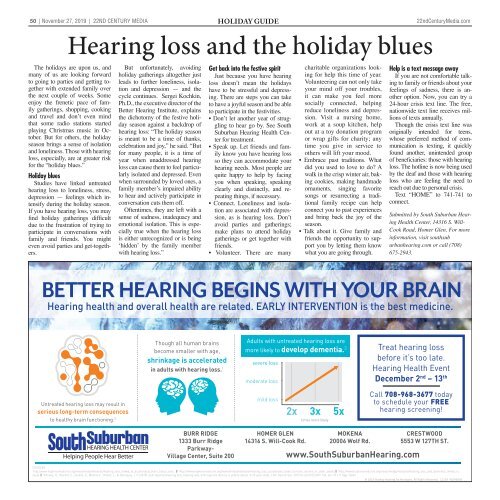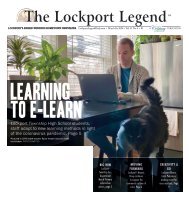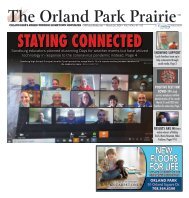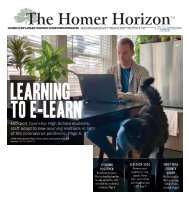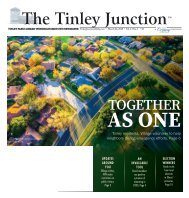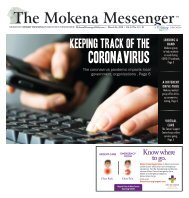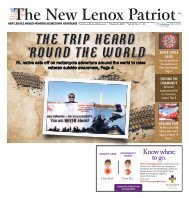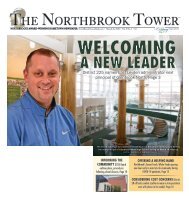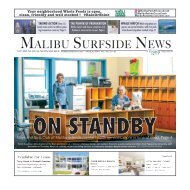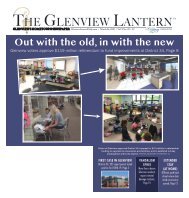Create successful ePaper yourself
Turn your PDF publications into a flip-book with our unique Google optimized e-Paper software.
50 | November 27, 2019 | 22nd century media holiday guide<br />
22ndCenturyMedia.com<br />
Hearing loss and the holiday blues<br />
The holidays are upon us, and<br />
many of us are looking forward<br />
to going to parties and getting together<br />
with extended family over<br />
the next couple of weeks. Some<br />
enjoy the frenetic pace of family<br />
gatherings, shopping, cooking<br />
and travel and don’t even mind<br />
that some radio stations started<br />
playing Christmas music in October.<br />
But for others, the holiday<br />
season brings a sense of isolation<br />
and loneliness. Those with hearing<br />
loss, especially, are at greater risk<br />
for the “holiday blues.”<br />
Holiday blues<br />
Studies have linked untreated<br />
hearing loss to loneliness, stress,<br />
depression — feelings which intensify<br />
during the holiday season.<br />
If you have hearing loss, you may<br />
find holiday gatherings difficult<br />
due to the frustration of trying to<br />
participate in conversations with<br />
family and friends. You might<br />
even avoid parties and get-togethers.<br />
But unfortunately, avoiding<br />
holiday gatherings altogether just<br />
leads to further loneliness, isolation<br />
and depression — and the<br />
cycle continues. Sergei Kochkin,<br />
Ph.D., the executive director of the<br />
Better Hearing Institute, explains<br />
the dichotomy of the festive holiday<br />
season against a backdrop of<br />
hearing loss: “The holiday season<br />
is meant to be a time of thanks,<br />
celebration and joy,” he said. “But<br />
for many people, it is a time of<br />
year when unaddressed hearing<br />
loss can cause them to feel particularly<br />
isolated and depressed. Even<br />
when surrounded by loved ones, a<br />
family member’s impaired ability<br />
to hear and actively participate in<br />
conversation cuts them off.<br />
Oftentimes, they are left with a<br />
sense of sadness, inadequacy and<br />
emotional isolation. This is especially<br />
true when the hearing loss<br />
is either unrecognized or is being<br />
‘hidden’ by the family member<br />
with hearing loss.”<br />
Get back into the festive spirit<br />
Just because you have hearing<br />
loss doesn’t mean the holidays<br />
have to be stressful and depressing.<br />
There are steps you can take<br />
to have a joyful season and be able<br />
to participate in the festivities.<br />
• Don’t let another year of struggling<br />
to hear go by. See South<br />
Suburban Hearing Health Center<br />
for treatment.<br />
• Speak up. Let friends and family<br />
know you have hearing loss<br />
so they can accommodate your<br />
hearing needs. Most people are<br />
quite happy to help by facing<br />
you when speaking, speaking<br />
clearly and distinctly, and repeating<br />
things, if necessary.<br />
• Connect. Loneliness and isolation<br />
are associated with depression,<br />
as is hearing loss. Don’t<br />
avoid parties and gatherings;<br />
make plans to attend holiday<br />
gatherings or get together with<br />
friends.<br />
• Volunteer. There are many<br />
charitable organizations looking<br />
for help this time of year.<br />
Volunteering can not only take<br />
your mind off your troubles,<br />
it can make you feel more<br />
socially connected, helping<br />
reduce loneliness and depression.<br />
Visit a nursing home,<br />
work at a soup kitchen, help<br />
out at a toy donation program<br />
or wrap gifts for charity; any<br />
time you give in service to<br />
others will lift your mood.<br />
• Embrace past traditions. What<br />
did you used to love to do? A<br />
walk in the crisp winter air, baking<br />
cookies, making handmade<br />
ornaments, singing favorite<br />
songs or resurrecting a traditional<br />
family recipe can help<br />
connect you to past experiences<br />
and bring back the joy of the<br />
season.<br />
• Talk about it. Give family and<br />
friends the opportunity to support<br />
you by letting them know<br />
what you are going through.<br />
Help is a text message away<br />
If you are not comfortable talking<br />
to family or friends about your<br />
feelings of sadness, there is another<br />
option. Now, you can try a<br />
24-hour crisis text line. The free,<br />
nationwide text line receives millions<br />
of texts annually.<br />
Though the crisis text line was<br />
originally intended for teens,<br />
whose preferred method of communication<br />
is texting, it quickly<br />
found another, unintended group<br />
of beneficiaries: those with hearing<br />
loss. The hotline is now being used<br />
by the deaf and those with hearing<br />
loss who are feeling the need to<br />
reach out due to personal crisis.<br />
Text “HOME” to 741-741 to<br />
connect.<br />
Submitted by South Suburban Hearing<br />
Health Center, 14316 S. Will-<br />
Cook Road, Homer Glen. For more<br />
information, visit southsub<br />
urbanhearing.com or call (708)<br />
675-2943.<br />
BETTER HEARING BEGINS WITH YOUR BRAIN<br />
Hearing health and overall health are related. EARLY INTERVENTION is the best medicine.<br />
Though all human brains<br />
become smaller with age,<br />
shrinkage is accelerated<br />
in adults with hearing loss. 1<br />
Adults with untreated hearing loss are<br />
more likely to develop dementia. 3<br />
severe loss<br />
moderate loss<br />
Treat hearing loss<br />
before it’s too late.<br />
Hearing Health Event<br />
December 2 nd – 13 th<br />
Untreated hearing loss may result in<br />
serious long-term consequences<br />
to healthy brain functioning. 2<br />
mild loss<br />
2x 3x 5x<br />
times more likely<br />
Call 708-968-3677 today<br />
to schedule your FREE<br />
hearing screening!<br />
HEARING HEALTH CENTER<br />
Helping People Hear Better<br />
BURR RIDGE<br />
1333 Burr Ridge<br />
Parkway-<br />
Village Center, Suite 200<br />
HOMER GLEN<br />
14316 S. Will-Cook Rd.<br />
MOKENA<br />
20006 Wolf Rd.<br />
www.SouthSuburbanHearing.com<br />
CRESTWOOD<br />
5553 W 127TH ST.<br />
SOURCES:<br />
1<br />
http://www.hopkinsmedicine.org/news/media/releases/hearing_loss_linked_to_accelerated_brain_tissue_loss_ | 2 http://www.hopkinsmedicine.org/news/media/releases/hearing_loss_accelerates_brain_function_decline_in_older_adults | 3 http://www.hopkinsmedicine.org/news/media/releases/hearing_loss_and_dementia_linked_in_<br />
study | 4 Amieva, H., Ouvrard, C., Giulioli, C., Meillon C., Rullier, L., & Dartigues, J. F. (2015). Self-reported hearing loss, hearing aids, and cognitive decline in elderly adults: A 25-year study. J Am Geriatr Soc. 2015 Oct;63 (10):2099-104. doi: 10.1111/jgs.13649<br />
© 2019 Starkey Hearing Technologies. All Rights Reserved. 11/19 42043836


